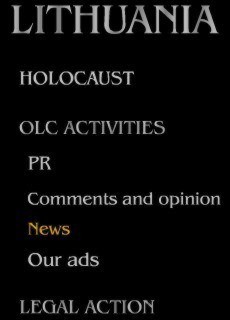|
Speakers
heatedly debate whether Vilnius is taking bold steps
forward, or whitewashing past.
An academic debate at a conference about Holocaust remembrance in Lithuania turned
into a row on Thursday when two speakers at the gathering
in Jerusalem exchanged accusations.
Efraim Zuroff, the director of the Simon Wiesenthal Center in Israel, lashed
out at Sarunas Liekis, a professor at Vytautas Magnus
University and former director of the Vilnius Yiddish
Institute, saying he fired a Yiddish scholar who criticized
the government’s Holocaust remembrance policy.
“Dovid Katz, who taught for
11 years at Vilnius and is a leading expert in Yiddish,
initially didn’t deal with politics at all,” he said.
“But when the Lithuanian government started going after
Holocaust survivors [for alleged defamation and war crimes]
he got involved.
They told him his contract
wouldn’t be renewed if he continued and it wasn’t.
Liekis told Zuroff he had
no part in Katz’s departure, adding that his claims were
“unprofessional” and constituted an “ad hominem attack.”
“Dovid Katz was not hired
by the institute but by its friends in America,” he said.
“When his contract ended it was not renewed for professional
reasons, the same reasons it was not renewed at Oxford.
I have no influence over people in Santa Monica that
I could get him fired.”
“The problem with Efraim is
that he’s never interested in the facts,” he added.
The recriminations between
the two are part of a broader debate relating to how
events that took place in the Baltics during World War
Two are remembered. Since gaining independence from the
Soviet Union, Lithuania, Latvia and Estonia have lionized
local nationalists who fought the communists alongside
the Nazis during the war. But Zuroff and other Jewish
groups say the esteem with which the nationalists are
held in those countries ignores their complicity in the
systematic murder of Jews.
“Not a single Lithuanian has
been brought to justice by these governments,” said Zuroff,
referring to the killing of thousands of Jews by nationalists
in a wave of pogroms in 1941. “They’ve always waited
until they are too old to prosecute.
There’s always been an effort
to create a false symmetry between the crimes of the
Nazis and the communists and there’s no question that
in the past five years this has increased.”
Accusations have flown both
ways. In 2007 Lithuania wanted Yad Vashem Director Yitzhak
Arad extradited from Israel on suspicion of committing
war crimes against Lithuanians when he was a partisan
fighter in the forests during the war. A few months ago
Vilnius asked Israel to quiz Holocaust survivor Joseph
Melamed for allegedly defaming eight Lithuanian nationalists
he said were involved in atrocities against Jews.
Lithuania’s ambassador to
Israel Darius Degutis, who also attended the gathering
in Jerusalem, highlighted Lithuania’s recent support
for Israel in the international arena and asked to separate
between the crimes of the Nazis and the communists.
“We are not equating between
our tragedy and yours,” he said. “We are saying, please
understand our tragedy the way we understand yours.”
Degutis vehemently defended
his country’s record regarding Holocaust remembrance
saying it has made great strides forward in recent years.
“One of the key priorities
of our country is not just to remember the Holocaust
but to do everything we can to rebuild and restore the
Jewish community’s culture, history and heritage,” he
said. “What has been done by this government – and I
say this from a personal experience [as] I know how much
has been done – I don’t think any other government in
Europe has done as much in the last couple of years.”
Some Jewish observers agree
with Degutis. Evan Zimroth, a professor of English and
Jewish Studies at Queens College, the City University
of New York, who has been involved in Holocaust remembrance
in Lithuania for a decade, praised Vilnius for the progress
she said it has made.
“The way I see it, things
are moving forward,” she said over the phone from the
UK last week. “I deal with the Lithuanian government
and my dealings with them and parts of the Jewish community
involved in restitution issues have been very positive.”
She said Lithuania had recently
passed a restitution law and was doing its best to battle
occasional manifestations of anti-Semitism in the country,
but added that change cannot happen overnight.
“Nobody wants to whitewash
anything and nobody should want to whitewash something,”
she said. “Are there problems in Lithuania? Sure, it’s
a new country. Can you control the press? The freedom
of speech? The display of swastikas? Even in the United
States marches where people carry swastikas are defended
by the First Amendment.”
But Zuroff believes the recent
concessions made by Vilnuis including the restitution
law are a smoke-screen intended to placate some parts
of the Jewish community while hiding Lithuanian complicity
in the genocide of Jews during World War Two.
He said that if Lithuania
was serious about its commitment to Holocaust remembrance
then first it must pull out of the 2008 Prague Declaration,
a treaty signed by several east European countries which
he argues equates the crimes of the Nazis and communists.
“What I want to see first
of all is a Lithuanian ambassador come and say the Prague
declaration is untenable – he would be a welcome guest,”
he said.
“All dealings of the Holocaust
have to deal with Lithuanian complicity. For instance,
there is a museum in Vilnius called the genocide museum
housed in the building where the KGB sat but before that
it was where the Gestapo was.
“There wasn’t a word about
the Holocaust in this museum.
Only after much criticism
the government took one small cell and installed an exhibition
on the Holocaust in Lithuania but it didn’t have a word
about who the killers were. It’s unbelievable and it’s
the heart of the problem. You have to tell the truth
and teach the truth.” jpost.com
|


